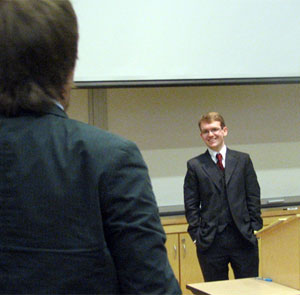 |
| Richard Lizius from the University of Toronto, the tournament's top speaker, answers a point of information from Jon Laxer in the championship round. (Myles McNutt Photo) |
Months of preparation. Sweaty palms. A game plan primed, but one that could change as things get underway.
Let the debating begin.
This past weekend, ª∆…´÷±≤• played host to the 2008 national championships of CUSID, the Canadian University Society for Intercollegiate Debate. More than 100 of the country‚Äôs best debaters across academic disciplines gathered to argue everything from legalizing prostitution to reforming Israel‚Äôs electoral system. The tournament was run by members of ª∆…´÷±≤•‚Äôs Sodales Debating Society, who also served as a significant portion of the tournament‚Äôs judging pool.
Competitive debating is a rather unique experience. It’s not explicitly academic, but the exchange of ideas is often as insightful and philosophical as in the classroom. It’s not a varsity sport, but the competition is no less fierce than on the basketball court or hockey rink. It’s not a free-for-all, but things can get a bit unruly at times, not unlike the Canadian Parliament which its format emulates.
Here’s how a round of debate works: teams of two prepare cases in response to resolutions presented to them by the host club. At this particular tournament, the resolutions were designed to be “squirreled,” meaning the government had free reign to connect them to any topic that they want to argue. To add a local flavour to the festivities, all of the resolutions were one-liners from videos by local comedy troupe Picnicface, which also performed before the tournament’s final round.
Once the teams have a resolution to work with, the government team is given 15 minutes to prepare a case of its choosing; the opposition won’t know the topic until the debate begins. For the next 35 minutes, both sides try and sway the judges to their side with the style and substance of their argumentation. Debaters are even allowed to interrupt each other’s speeches with “points of information” and challenge arguments on the spot.
Although Sodales was not able to compete due to its hosting duties, society president Allison O'Beirne says the club welcomed the opportunity to increase its national profile.
‚ÄúHosting the CUSID national debating championships is an incredible opportunity for Sodales,‚Äù she explains. ‚ÄúWe feel that we're not just representing Sodales here, but also ª∆…´÷±≤• and Eastern Canadian debaters as a whole. The whole club‚Äôs stepping up to the challenge of taking on such a huge endeavor.‚Äù
After six rounds of debate on Friday and Saturday, the top eight teams advanced to the quarter-final playdowns on Sunday. The final round came down to two teams from the University of Toronto’s Hart House debating society, with Jon Laxer and Monica Ferris on side of the government and Richard Lizius and Paul-Erik Veel on side of the opposition debating whether or not blackmail should be legalized. It was a competitive round, but after conferring, the judges unanimously awarded Mr. Laxer and Ms. Ferris the championship trophy. Mr. Lizius was recognized as the tournament’s top-scoring speaker, while Vinay Kumar Mysore from McGill University won the public speaking competition that takes place in between rounds.
With the debating year finished for the Sodales Debating Society, the club starts to prepare for next year‚Äôs activities. ª∆…´÷±≤• will be hosting the 2008 Atlantic novices ‚Äì a tournament solely for new debaters ‚Äì early in the fall and will send teams to the 2009 national championships at the University of Saskatchewan in one year‚Äôs time.
